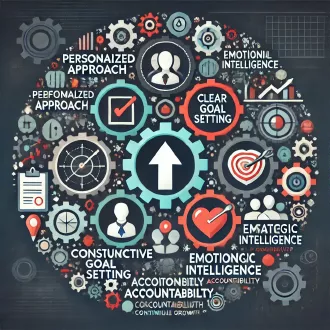Transcription Positive reinforcement
Positive reinforcement is a powerful strategy that transcends age and context. Although we are adults and recognize that we do not need constant praise like children, in reality we all appreciate and enjoy being recognized for our accomplishments and efforts. The feeling of receiving praise and recognition for mastering a skill or doing a job well done is universally rewarding.
As a coach, one of the key responsibilities is to motivate and encourage the active participation of coachees in their continuous improvement process. This role is not only about teaching skills, but cultivating a positive and supportive mindset. When you provide positive reinforcement, praise the effort and achievements of your coachees, you are boosting their intrinsic motivation to keep learning and growing.
It is important that coachees feel valued and recognized for their efforts. If you don't reinforce these positive behaviors by praising, thanking or acknowledging them in some way, there is a risk that they will feel demotivated. Conversely, by focusing on what they have accomplished and making them feel good about it, you are laying a solid foundation for their continued growth.
This is especially relevant in leadership and teamwork coaching, where trust and commitment are critical. Positive reinforcement becomes an essential tool for nurturing morale and motivation within a team.
Recognizing individual and collective achievements not only improves the work environment, but also stimulates a sense of camaraderie and mutual support. Praise and rewards for positive efforts and results contribute to a virtuous cycle of performance.
Here we explore some of the areas in which positive reinforcement positively impacts that you can implement in your leadership style:
- Recognition of Achievement: publicly acknowledge the accomplishments and goals achieved by team members. Public recognition reinforces the importance of individual and collective efforts.
- Sincere praise: Offer genuine and specific praise for a job well done. Be specific about what you appreciate and how it contributed to success.
- Boost self-esteem: Positive reinforcement helps raise the self-esteem and confidence of team members. It helps them feel valued and appreciated.
- Impact on motivation: Recognition and praise reinforce intrinsic motivation, as team members feel incentivized to keep doing a good job.
- Open communication: Share your observations and praise in a transparent and open manner. This promotes a culture of appreciation and effective communication.
- Reinforcement of desired behaviors: Positive reinforcement can be used to encourage behaviors and attitudes you want to see more of in the team.
- Celebration of milestones: Celebrate important milestones and significant accomplishments with enthusiasm and gratitude. This creates a sense of community and celebration.
-
Recent publications by coaching leadership




